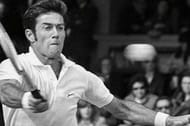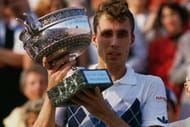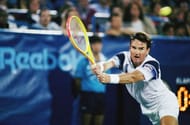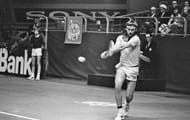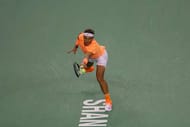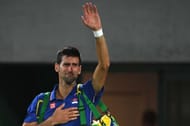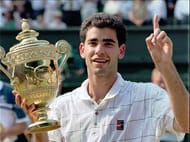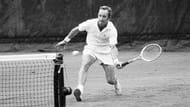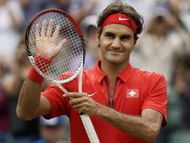Being regarded as one of the greatest in any sport is a big achievement for any sportsperson and it is no different for tennis.
Over the years, number of players have put up some scintillating performances throughout their careers and have had their name written in the history books as one of the greatest players to have graced the sport. Many of these players have accomplished great feats including being World No.1, winning all four Grand Slams, winning Olympic Gold with Steffi Graf even achieving the feat of a Golden Slam in 1988 which includes winning all four Grand Slams and an Olympic Gold in the same year.
However, there have been many legends of the sport who have won a number of tournaments and accolades but have some big trophies missing from their cabinet. Let’s take a look at ten absolute legends of the sport who haven’t been able to win some big tournaments in their career.
#10. Martina Hingis- French Open
It may come as a real surprise that one of the greatest tennis players was denied a Career Slam but that’s the case for Martina Hingis Considered to be one of the greatest tennis players of all-time, had it not been for her ankle injuries, Hingis would definitely have won thrice the number of Grand Slam Singles titles.
She is one of only few players who have reached at least the final of all four majors across Singles, Doubles and Mixed Doubles.
Hingis was at the top of the WTA rankings for a total of 209 weeks. At the age of 15 years and 9 months, Hingis became the youngest-ever Grand Slam champion across all three circuits and at the age of 16 years and 117 days, Hingis became the youngest-ever Grand Slam Singles champion by winning her first Grand Slam 72 days before Monica Seles.
The ‘Swiss Miss’ has won five Grand Slam Singles titles that include three consecutive Australian Open titles from 1997-1999, a Wimbledon title in 1997, and a US Open title also in 1997. She also won two WTA Finals in 1998 and 2000.However, the French Open eluded Hingis with her best performance being reaching the final in 1997 and 1999. 1997 was expected to be Hingis’ year and she began beautifully by winning the Australian Open title and was expected to be a prime contender for the French Open title.
Seeded first, Hingis beat a couple of former champions in Arantxa Sanchez Vicario and Monica Seles in the quarters and semis respectively. However, she was beaten by ninth seed Croatian Iva Majoli in the final in straight sets.
Two years later, in 1999, Hingis once again made the final as the top seed and prior to her final against Steffi Graf, she hadn’t dropped a single set throughout the tournament. She even took the first set and was three points away from victory in the second set but Graf bounced back and took the match and her first Grand Slam in three years.
She later made a couple of semi-final appearances in 2000 and 2001 before injuries forced her to retire prematurely. However, she came back but only made it to the quarter-finals in 2006. Martina Hingis is definitely the greatest female tennis player to have been denied a Career Slam in the singles.
#9. Ken Rosewall- World Tour Finals and Wimbledon
The 1950s was a period where Australia were the premier dominants of World Tennis and Ken Rosewall was one of the finest exponents of the sport during this period. Primarily a back-court player, Rosewall was recognized for his pace, agility, powerful volley and most notably, his backhand which is regarded to be one of the best in the history of the sport.Over a 24-year playing career, Rosewall won a total of 133 career Singles titles including eight Grand Slams that included four Australian Open titles in 1953, 1955, 1971 (where he became the first player during the Open Era to win a Grand Slam title without dropping a set), and 1972, two French Open titles in 1953 and 1968 and two US Open titles in 1956 and 1970. However, the only Grand Slam missing from Rosewall’s trophy cabinet is the Wimbledon; the final of which he reached four times in 1954, 1956, 1970, and 1974.In his first final in 1954, Rosewall was the third seed and had two hardly fought wins in the quarters and the semis against eighth seed Rex Hartwig and top seed Tony Hrabert before locking horns with eleventh seeded Czech-Egyptian Jaroslav Drobny who beat him in four sets by the scoreline of 13-11, 4-6, 6-2, 9-7.His second final came two years later where he was the second seed and was up against top seeded compatriot Lew Hoad. Rosewall lost the match in similar fashion as in 1954 with Hoad prevailing in four sets by the scoreline of 6-2, 4-6, 7-5, 6-4. With the Wimbledon having a decade-long ban from 1957-1967, Rosewall did not reach another Wimbledon final until 1970. This time, the competition was intense with the likes of Rod Laver, Tony Roche, John Newcombe, Arthur Ashe, Stan Smith and Ilie Nastase being fierce competitors. However, Rosewall, now the fifth seed, defeated compatriot Tony Roche in the quarter-finals and Briton Roger Taylor in the semi-finals to set up a final encounter against second seeded compatriot John Newcombe. The match was a thriller with Newcombe eventually prevailing in five sets by the scoreline of 5-7, 6-3, 6-2, 3-6, 6-1.
During the 1974 Championships, Rosewall avenged his 1970 final defeat against Newcombe in the last eight and beat fourth seeded Stan Smith in the semi-finals to setup a final meeting with Jimmy Connors who comprehensively beat him in straight sets. This also was Rosewall’s second last appearance at Wimbledon with his final appearance coming the following year.Another major prize Rosewall couldn’t capture was the World Tour Finals where he ended 3rd in the round robin in 1970, behind Stan Smith and Rod Laver.
#8. Ivan Lendl- Wimbledon
One of the greatest players not to have completed a Career Slam, Ivan Lendl’s numbers speak for themselves. Known for his heavy topspin from the baseline, Lendl was World No.1 for a total of 270 weeks and won 94 Career Titles including eight Grand Slam titles; two Australian Open titles in 1989 and 1990, three French Open titles in 1984, 1986 and 1987, and three consecutive US Open titles from 1985-1987. He also won a total of five ATP World Tour Finals in 1981, 1982, 1985, 1986 and 1987.
Lendl is probably the greatest player not to have won a Wimbledon title, having lost two successive finals in 1986 and 1987.After a brilliant showing at the French Open which he won, Lendl was seeded first at Wimbledon and was arguably the tournament’s heaviest favorite. After two grueling matches in the quarter-finals and the semi-finals, Lendl locked horns with 18-year old reigning champion Boris Becker. Becker was clearly the better player of the day and won the match in straight sets.
Lendl was once again the favorite in 1987 and this time, coming into the final, his chances were pretty good, especially with his biggest adversary Boris Becker out of the tournament. The second seeded Lendl faced 11th seeded Australian Pat Cash in the final.
However, once again Lendl was beaten in straight sets. Although he won three more Grand Slams after the 1987 Wimbledon, Lendl was never able to reach another Wimbledon final. Although he’s one of the all-time legends of the sport, Lendl will surely be ruing his missed opportunities to capture the Wimbledon crown in 1986 and 1987.
#7. Jimmy Connors- French Open
Regarded to be one of the greatest players in the history of the sport, Jimmy Connors was known for his powerful two-handed backhand and his service return. Connors was World No. 1 for a then-record 160 consecutive weeks and a total of 268 weeks overall.
Having won 109 Career Singles titles, Connors won eight Grand Slam Singles titles that included an Australian Open in 1974, two Wimbledon titles in 1974 and 1982, and five US Open titles in 1974, 1976, 1978, 1982 and 1983. He also won the ATP World Tour Finals in 1977.
However, the one Grand Slam that eluded him was the French Open with his best performance being semi-final appearances in 1979, 1980, 1984 and 1985.The 1979 Roland Garros was the first edition of the Roland Garros where Connors had crossed the second round. The second seeded Connors was up against unseeded Paraguayan Victor Pecci in the semis who beat him in four sets.
The following year, Connors again reached the semi-finals; this time seeded third in the competition. In the semis, Connors faced 1977 Australian Open champion Vitas Gerulaitis. The match was a highly contested battle which lasted for five sets with the Lithuanian-American triumphing over Connors 6-1, 3-6, 6-7, 6-2, 6-4.
After three successive quarter-final appearances in the following years, Connors reached his third French Open semi-final in 1984 where he faced top-seeded John McEnroe. McEnroe comprehensively beat him in straight sets.
His last appearance at a Roland Garros semi-final came in 1985.
This time, Connors faced defending champion Ivan Lendl in the semi-finals who thrashed him 6-2, 6-3, 6-1. Even though Connors won the US Open when it was played on clay court once, he was never able to produce his best at the French Open which eventually denied him a Career Slam.
#6. Bjorn Borg- Australian Open and US Open
One of the greatest players in tennis history, Bjorn Borg is undoubtedly the greatest tennis player that Sweden has ever produced. Known for his powerful groundstrokes and his unusually unorthodox backhand, Borg had a win percentage of 82.74 throughout his entire career and was at the top of the ATP rankings for a total of 109 weeks. Borg won a total of 64 career titles that included eleven Grand Slam titles and two World Tour Finals. His eleven Grand Slam titles included six French Open titles and five Wimbledon titles. Borg won both the French Open and Wimbledon for three successive years and captured three Grand Slams without losing a set.However, the Swede never won an Australian Open or a US Open title in his short but illustrious career. He only made one appearance at the Australian Open as a teenager in 1974 where he exited in the third round to ninth seed and eventual runner-up Phil Dent.
In the US Open, Borg made it to the final on four occasions in 1976, 1978, 1980, and 1981. After winning the Wimbledon in 1976, Borg was considered an overwhelming favorite for the US Open and was the second seed heading into the tournament.
After beating Ilie Nastase in the semi-finals which was a rematch of the Wimbledon final, Borg was now up against top seed Jimmy Connors. Connors won the match in four sets by the scoreline of 6-4, 3-6, 7-6, 6-4 to clinch his second US Open title.
His next final came two years later, in 1978 where he was the top seed and once again he was up against Connors who was the second seed. This time, Connors had even a more comfortable victory as he demolished Borg in straight sets by the scoreline of 6-4, 6-2, 6-2.
His next final was in 1980 when he was once again the top seed and was expected to win the tournament, having won both the French Open and the Wimbledon. This time, Borg was up against reigning champion John McEnroe.
McEnroe won the opening two sets 7-6, 6-1 but Borg held his nerve and levelled the match by taking the third and fourth set before McEnroe prevailed 6-4 in the fifth set to win his second US Open title.
Borg’s last appearance at the US Open final came in the following year where he once again faced McEnroe. Borg took the first set 6-4 but McEnroe bounced back and took the next three sets to clinch his third consecutive US Open title.
25 at that time, Borg wouldn’t play another Grand Slam and occupational burnout due to the pressure and constant attention he was getting eventually took its toll on him and forced him to retire prematurely at the age of 26.
#5. Rafael Nadal- World Tour Finals
The King of Clay might not be the same player he was a few years back but just looking at his numbers is enough to say why he is regarded to be one of the greatest players in the history of the game.
Known for his aggressive baseline play, and athleticism around the court, Nadal has won almost everything throughout his professional career, having won a total of 69 career titles so far that include 14 Grand Slam titles- an Australian Open in 2009, a record nine French Open titles, two Wimbledon titles in 2008 and 2010, and two US Open titles in 2010 and 2013.
He has also won two Olympic golds, having won the gold medal in the Singles tournament of the Beijing Olympics and most recently, the gold medal in the Men’s Doubles tournament of the Rio Olympics.
However, the one major title that Nadal is yet to win is the ATP World Tour Finals with his best performance being two runner-up performances in 2010 and 2013. 2010 was perhaps Rafa’s best year as he won the French Open, Wimbledon, and the US Open (which helped him complete a Career Slam) and was a heavy favorite to win the ATP World Tour Finals in London.
Drawn in Group A alongside Novak Djokovic, Andy Roddick, and Tomas Berdych, Nadal was in dominant form during the group stages, having won all three matches and was up against fifth seeded Andy Murray in the semi-finals. Murray put up a very tough fight before Nadal won in three sets by the scoreline of 7-6, 3-6, 7-6.
In the final, Nadal was up against Roger Federer who hadn’t lost a single set prior to the final. Federer won the opening set 6-3 but Nadal bounced back to take the second set by the same scoreline before Federer demolished him 6-1 in the third set.
Nadal’s second appearance in the final of the World Tour Finals came three years later in 2013. Once again, Nadal was considered a heavy favorite to clinch the title as only months ago, he had retained the World No.1 ranking by winning the US Open.
Nadal was placed in Group A alongside David Ferrer, Tomas Berdych, and Stan Wawrinka and had won all three group games to set up a semi-final clash against Roger Federer. Nadal beat Federer 7-5, 6-3 and was up against Novak Djokovic in the final.
Djokovic cleaned up Nadal in straight sets to capture his third World Tour Finals title. Nadal still has a very good chance to make the World Tour Finals but given his present form as well as the kind of form some of his top competitors are in, the chances of winning his maiden ATP World Tour Finals title are bleak.
#4. Novak Djokovic – Olympic Gold
The current World No. 1 Novak Djokovic is already being considered to be one of the greatest tennis players of all-time and by some, to be the greatest ever due to his dominance in World Tennis since the last five years. Predominantly an all-court player, Djokovic emphasizes on an aggressive baseline play, being consistent on both wings and with a powerful backhand which according to many, is the best in today’s game.
Djokovic’s win percentage of 83% is the best in the Open Era and so far, he has won 66 career titles that include 12 Grand Slams and five ATP World Tour Finals. His Grand Slam titles include six Australian Open titles in 2008, 2011, 2012, 2013, 2015 and 2016, a French Open title in 2016, three Wimbledon titles in 2011, 2014 and 2015, and two US Open titles in 2011 and 2015.
Djokovic has won everything there is to win in tennis except an Olympic gold with his best performance being a bronze medal at the 2008 Beijing Olympics.
The Beijing games was Djokovic’s first appearance at the Olympics and he was in good form throughout the tournament until the semi-finals where he was defeated by eventual gold-medalist Rafael Nadal. However, Djokovic secured the bronze by defeating American James Blake in the bronze medal playoff in straight sets.
Djokovic was one of the favorites to win the gold medal at the 2012 London Olympics but was once again beaten in the semi-finals by eventual gold-medalist Andy Murray in straight sets. However, this time, Djokovic lost in the bronze medal playoff to Juan Martin Del Potro also in straight sets.
After winning the Rogers Cup following a poor outing at the Wimbledon, Djokovic was not an overwhelming favorite at the Rio Olympics as he would have to face Juan Martin Del Potro in the opening round. A resurgent Del Potro stunned Djokovic in straight sets and ended the Serb’s hopes of an Olympic medal yet once again.
#3. Pete Sampras- French Open
One of the greatest players of all-time, Pete Sampras was well known for his accurate serve and was the World No.1 for a total of 286 weeks.
Sampras won a total of 64 career titles during his career including a then-record of fourteen Grand Slam Singles titles that consisted of two Australian Open titles in 1994 and 1997, a joint-record of seven Wimbledon titles in 1993, 1994, 1995, 1997, 1998, 1999 and 2000, and five US Open titles 1990, 1993, 1995, 1996, and 2002. He also won five ATP World Tour Finals in 1991, 1994, 1996, 1997 and 1999.
However, as seen with many top players such as Jimmy Connors, Boris Becker and Stefan Edberg, “Pistol Pete” was never able to capture a single French Open throughout his career with his best performance being a semi-final appearance in 1996.Clay was Sampras’ worst surface and his performances at the surface were relatively subdued. Despite a disappointing showing at the Australian Open, Sampras was seeded first at the French Open and reached his first Roland Garros semi-final after beating two-time champion Jim Courier in a tough five-set quarter-final.
However, his semi-final opponent Yevgeny Kafelnikov was just too much for him as the Russian beat Sampras 7-6, 6-0, 6-2. Kafelnikov later went on to win the tournament by defeating German Michael Stich in the final, thus winning his first of two Grand Slam titles.
Sampras, however, wasn’t even to cross the third round ever since and still remains one of the greatest players not to have achieved a Career Slam.
#2. Rod Laver- World Tour Finals
One of the greatest players to have ever set foot on a tennis court, Rod Laver was undoubtedly the greatest player of his time. Laver was known for his all-court play and his accurate left-handed serve with a number of critics describing him as “technically faultless”.
Laver won a total of 52 ATP titles throughout his career (200 overall) that included 11 Grand Slam titles. Six of his eleven Grand Slams were won before he turned professional.
The Australian won all four majors, having won three Australian open titles in 1960, 1962, and 1969, two French Open titles in 1962 and 1969, four Wimbledon titles in 1961, 1962, 1968, and 1969, and two US Open titles in 1962 and 1969. He completed a Career Slam on two occasions in 1962 and 1969.
However, the one big prize which Laver never won was the World Tour Finals with his first and only appearance at the tournament being a runner-up performance at the inaugural tournament in 1970 when it was known as the Pepsi-Cola Masters.
Back then, the tournament was only a round robin tournament where the top six ranked players would participate and the player at the top of the standings would be adjudged the winner. Alongside Laver, the other competitors were Stan Smith, Ken Rosewall, Arthur Ashe, Zeljko Franulovic and Jan Kodes.
Laver won four of the five matches with his only defeat coming against Stan Smith. At the end of the round robin, both Laver and Smith had four wins and a defeat and had a 9-4 aggregate on the number of sets won and lost. However, Smith was adjudged the winner by virtue of having beaten Laver and Laver ended the tournament as the runner-up.
#1. Roger Federer- Olympic Gold
Undoubtedly the greatest tennis player of all-time, Federer’s statistics and his longevity speak for themselves. When it comes to his playing style, there are hardly any superlatives which will be enough to describe him as he is a complete and versatile who was comfortable playing from the baseline as well as from the net with one of the best single-handed backhands the game has ever seen.
Federer has been at the top of the ATP rankings for a record 302 weeks which is the most for a male player and so far, has won a total of 88 Career titles that include 17 Grand Slam titles and six ATP World Tour Finals in 2003, 2004, 2006, 2007, 2010 and 2011.
His seventeen Grand Slam titles include four Australian Open titles in 2004, 2006, 2007 and 2010, a French Open title in 2009, a record-equaling seven Wimbledon titles in 2003, 2004, 2005, 2006, 2007, 2009, and 2012 and five consecutive US Open titles from 2004-2008.
However, the one prize which Federer is yet to win is an Olympic gold at the Singles tournament, having already won a Doubles gold medal with longtime friend Stan Wawrinka at the Beijing Olympics. Federer’s first participation at the Olympics was at Sydney in 2000 where he reached the semi-finals before losing to eventual silver-medalist Tommy Haas. In the bronze medal playoff, Federer lost to Frenchman Arnaude Di Pascuale.
In his next outing at Athens, Federer was the top seed but was ousted in the second round by eventual quarter-finalist Tomas Berdych in three sets despite taking the first set. Federer was once again the top seed during the 2008 Beijing Olympics and hadn’t dropped a single set before the quarter-finals where he was beaten by eighth seeded American James Blake in straight sets.
Federer was a heavy favorite to bag the gold medal during the 2012 London Olympics as he had won the Wimbledon a few weeks ago and was back at the top of the ATP rankings.
The Swiss had an easy run till the semi-finals where he beat Juan Martin Del Potro in a tight three-setter to setup a rematch of the Wimbledon final against Andy Murray and ensure his first Singles medal at the Olympics.
However, Murray comprehensively beat Federer in straight sets to take the gold medal. Till date, this remains Federer’s last appearance at the Olympics as he had to pull out of the Rio Olympics and the remainder of the 2016 ATP World Tour due to a knee injury. Given his age and recent injury struggles, it is highly unlikely that Federer will compete at the Tokyo Olympics.
Who Are Roger Federer's Kids? Know All About Federer's Twins
